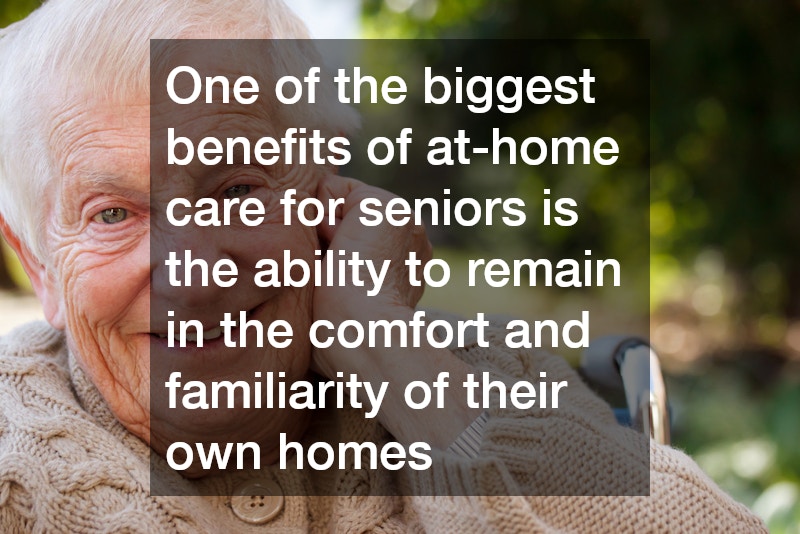
As people age, maintaining independence while ensuring safety and well-being becomes a central concern. For many seniors, staying in the comfort of their own home is a top priority. However, as they face physical, emotional, and health-related challenges, having the right support is essential. This is where personal care & companionship for seniors plays a crucial role. At-home care allows seniors to age in place, providing them with the assistance they need while preserving their independence and improving their quality of life.
In this blog, we’ll explore the numerous benefits of at-home care for seniors, focusing on how personal care and companionship can make a significant difference in their lives.
1. Comfort and Familiarity
One of the biggest benefits of at-home care for seniors is the ability to remain in the comfort and familiarity of their own homes. As people age, their homes become filled with memories, sentimental belongings, and a sense of routine. Staying in this environment allows seniors to feel more relaxed and secure, which is especially important when facing age-related health challenges.
At-home care services provide the necessary support without uprooting seniors from their homes. Whether it’s assistance with daily activities, managing medications, or offering companionship, personal care & companionship for seniors ensures they receive the help they need while staying in a space that brings them comfort.
Familiarity with their surroundings also helps reduce confusion and stress, which can be particularly beneficial for seniors with dementia or cognitive decline. The ability to remain in their own home, where everything is familiar, can help maintain their mental and emotional well-being.
2. Personalized Care
At-home care allows for a personalized approach to senior care, tailored specifically to meet the needs of the individual. Unlike care facilities, where one caregiver may be responsible for several residents, at-home care provides one-on-one attention. This means caregivers can focus entirely on the senior’s specific needs and preferences, ensuring that the level of care is always customized.
Personal care & companionship for seniors includes assistance with daily tasks such as bathing, dressing, meal preparation, and medication reminders. Caregivers can adjust their support based on the senior’s condition, providing more help when needed or promoting independence when possible. This personalized approach to care ensures that seniors receive the right amount of assistance while maintaining as much autonomy as possible.
3. Enhanced Independence
Many seniors fear losing their independence as they age. One of the main advantages of at-home care is that it helps seniors retain their independence while still receiving the support they need. With personal care & companionship for seniors, they can continue living in their own home, following their own routines, and making their own decisions, all with the added benefit of having someone to help when necessary.
Caregivers work with seniors to encourage independence by helping them with tasks they may struggle with but still allowing them to do as much as possible on their own. For example, a caregiver might assist with dressing by helping with difficult buttons but letting the senior choose their own clothing and complete easier tasks independently. This balance helps seniors maintain a sense of control over their lives, which is vital for their mental and emotional well-being.
4. Companionship and Social Interaction
Loneliness and isolation are common issues among seniors, particularly for those who live alone or have limited social interactions. At-home caregivers provide much-needed companionship and social interaction, which can greatly improve a senior’s emotional and mental health.
Companionship is more than just having someone around to help with tasks; it’s about building meaningful relationships. Caregivers offering personal care & companionship for seniors often engage in conversation, share activities, and offer emotional support. Whether it’s playing a board game, going for a walk, or simply chatting over a cup of tea, these interactions can prevent feelings of loneliness and depression.
Social engagement is crucial for seniors’ overall health, as it has been shown to reduce the risk of cognitive decline and improve life satisfaction. By having regular companionship, seniors can stay mentally active and emotionally fulfilled.
5. Safety and Health Monitoring
Seniors living at home may face safety risks, especially if they have mobility issues or health conditions that increase the likelihood of falls or medical emergencies. Caregivers providing at-home care play a critical role in ensuring that seniors remain safe in their environment. They can help with tasks that may pose a risk, such as moving around the house, preparing meals, or using the bathroom.
In addition to promoting safety, caregivers also help monitor the senior’s health. They can keep track of medication schedules, watch for changes in physical or mental condition, and ensure that medical appointments are attended. This consistent monitoring can help catch potential health issues early, preventing more serious complications.
For families, knowing that a trained caregiver is monitoring their loved one’s well-being can provide peace of mind. Personal care & companionship for seniors not only supports the senior but also helps relieve the stress and worry that family members may experience when caring for an elderly relative.
6. Cost-Effective Care Option
For many families, the cost of senior care is a significant concern. Nursing homes and assisted living facilities can be expensive, and not all seniors require the level of care provided in these environments. At-home care can be a more cost-effective solution, as seniors only pay for the services they need.
With personal care & companionship for seniors, families can choose the level of care that fits their budget and the senior’s needs, whether it’s full-time, part-time, or respite care. This flexibility allows families to create a care plan that is both affordable and effective, ensuring their loved one receives quality care without the financial burden of a care facility.
.

